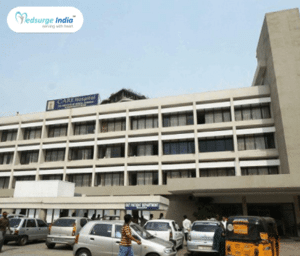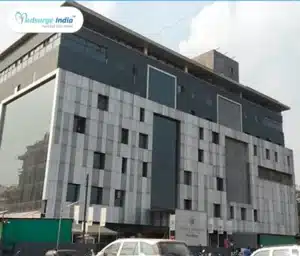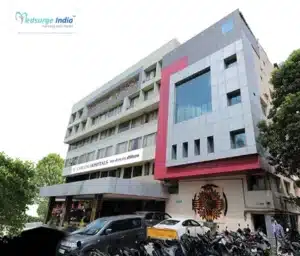Motor Neuron Disease Treatment Cost In India
Unlock Exclusive Discount : Your Gateway to Premium Healthcare with Medsurge India Health Value Card.

Unlock Exclusive Discount : Your Gateway to Premium Healthcare with Medsurge India Health Value Card.


Without the diverse set of cells known as motor neurons (MN), sophisticated life is not possible. MNs are in charge of combining data from the sensory systems and the brain to regulate both voluntary and involuntary movements. MNs can be divided into cranial and spinal subtypes, though. As a result, regeneration initiatives to lessen these public health burdens are concentrated on MNs. For the treatment of Motor neuron disease in India GP and a team of professionals will take care of you. A neurologist may order blood tests, brain and spine scan tests to assess the electrical activity in your muscles and nerves, etc. to help rule out other illnesses. As there is no known cure, treatment can lessen how much of an impact the symptoms have on your daily life. The total cost of Motor Neuron Disease Treatment in India is significantly less than the cost of the same procedure in countries like the United States, the United Kingdom, Germany, and others. International patients might significantly reduce the expense of MND by deciding on top-notch medical care locations like India, Dubai, Thailand, Turkey, and others.
A rare disorder that affects the brain and nerves is known as “Motor Neuron Disease” (MND). It results in weakness that progressively grows worse. Although there is no known cure for MND, there are therapies that can lessen how it affects a person’s day-to-day activities. Some people have had the ailment for a very long time.
Sadly, MND eventually leads to death and significantly shortens life expectancy.
Motor neurons come in two different types:
The soma, axon, and dendrites are the three parts that make up a motor neuron’s structure.
The top hospitals for treating motor neuron diseases are available in India. These facilities have cutting-edge technology, medical staff, and facilities. The Indian medicinal systems, including Ayurveda, Yoga, Panchakarma, Rejuvenation Therapy, etc., are some of the oldest medical systems in the world. India has the ability to offer affordable, high-quality medical and health services. Kerala, one of India’s southern states, has established medical tourism as one of its goods to promote travel there. Ayurveda centers are becoming a common feature of new hotels and resorts. The majority of international visitors now solely travel to India for Ayurveda. The top tour companies have Ayurveda listed in their brochures. promoting global health tourism If appropriate attention is paid to health and medical issues, the rise of medical and health tourism in India might be much higher.
The following are some of India’s primary advantages:
In addition to the US and the UK, many people are looking for other countries that provide MND therapy at affordable costs while upholding excellent standards of care and exceptional results. India is one of the top overseas locations for Westerners seeking MND treatment. Your needs are met by India because it is among the best in the world for performance and experience at a fair price. Above all, India boasts the most affordable medical tourism prices when compared to other nations.
Know More – Brain Tumor Surgery Cost in India
The precise causes of the onset of motor neuron disease are still unknown. Most cases of MND are infrequent. This indicates that most MND patients do not have a history of the disease in their families. Some occurrences can be familial, meaning a close family member may have frontotemporal dementia or another illness connected to MND.
Although the precise origin of motor neuron disease is unknown, research suggests that a number of related factors may contribute to the condition. Given below are a few of these factors:
Based on whether they are inherited or not, motor neuron illnesses are divided into several groups. Whether a problem affects upper motor neurons, lower motor neurons, or both influences how it is classified. The following are a few of the prevalent types of motor neuron diseases:
Your neurologist in India can create the best motor neuron disease treatment plan for you with the help of the type of motor neuron disease you have been diagnosed with.
There are no predefined or routine options available for motor neuron disease treatment in India. However, supportive therapies can help patients maintain their lifestyles while relieving symptoms. Motor neuron disease patients are frequently cared for by a multidisciplinary team of specialists. Your neurologist, respiratory therapist, occupational therapist, physiotherapist, and social worker are examples of these professionals. In India, some of the approaches used to treat motor neuron disease are as follows:
Before taking this medication, you should consult with your neurologist. Riluzole cannot repair motor neuron damage. As a result, it cannot cure MND. It can, however, extend survival. Its precise mechanism is unknown. Riluzole, on the other hand, suppresses glutamate, which is toxic to cells in excess amounts. Its anti-glutamate function may prevent motor neuron damage and prolong survival in some MND patients. However, its role must be investigated further.
The average Motor Neuron Diseases Treatment Cost in India starts from USD 4,000. There is currently no known treatment for MND. The major goal of treatment is to extend the patient’s life and make sure they have a comfortable life. In India, a range of these treatments is accessible. Each patient receives a unique treatment regimen based on the type of MND they have. On the other hand, prompt treatment increases the affected person’s life expectancy. There is a tonne of evidence demonstrating how effective various treatments are even though there is no information available on the overall success rate of Motor Neuron Diseases treatment in India.
In India, MND is quite accurately diagnosed. In addition, surgical treatment for ALS patients who require it was demonstrated to reduce symptoms in 90% of individuals who underwent surgery.
The best MND Surgery Hospitals in India that performed body and facial modification for patients are renowned for their warmth and attentiveness to their needs. These facilities are available to some of India’s top neurosurgeons who are experts in their professions. For an international patient, selecting a good hospital for treatment might be challenging. It is a critical choice that needs to be made while keeping a number of things in mind, such as:
Medsurge India is a prestigious support system for patients looking for doctors, hospitals, and specialized treatments. We'll find the most suitable medical options for you. Regarding your medical issues, our team will give you a list of certified, reputable, and trusted doctors and hospitals. Additionally, we offer a treatment strategy that fits your budget. Apart, we assist patients with obtaining travel authorizations, medical visas, and a multitude of other things.
A: Life expectancy after diagnosis ranges from one to five years, with 10% of MND patients living for ten years or more. People with MND have complex needs that vary from person to person.
A: MND has no cure, but there are treatments to help reduce its impact on a person's daily life. Some people have had the condition for a long time. MND can significantly reduce life expectancy and, sadly, eventually result in death.
A: The various types of MND cause similar symptoms and are classified into three stages: early, middle, and advanced. The diseases progress at different rates and have varying degrees of severity.
A: The onset of MND varies from person to person. Some of the people we spoke with first noticed weakness or stiffness in their legs or feet, while others noticed it in their arms or hands. These symptoms are typical of amyotrophic lateral sclerosis, the most common type of MND (ALS).
A: The final stages of MND are typically characterized by a gradual weakening of the breathing muscles and increased sleepiness. This is the most common cause of death, either due to an infection or because the muscles stop working. Specialist palliative care improves the quality of life by controlling symptoms.

Neurologist
Consultant
14+ Years
Care Hospital, Banjara Hills, Hyderabad
View Doctor

Neurologist
Clinical Director & Senior Consultant
36+ Years
Care Hospital, Banjara Hills, Hyderabad
View Doctor
Neurologist
Consultant
11+ Years
Care Hospital, Banjara Hills, Hyderabad
View Doctor
Neurosurgeon
Senior Consultant
9+ years
Meitra Hospital, Calicut, Kerala
View Doctor
Neurosurgeon
Senior Consultant
16+ years
Meitra Hospital, Calicut, Kerala
View Doctor
Neurosurgeon
HOD & Senior Consultant
25+ years
Meitra Hospital, Calicut, Kerala
View Doctor
Neurologist
Associate Consultant
12+ years
Meitra Hospital, Calicut, Kerala
View Doctor
Neurologist
Senior Consultant
12+ years
Meitra Hospital, Calicut, Kerala
View Doctor
Neurosurgeon
Senior Consultant
10+ years
Care Hospitals HITEC City
View Doctor









By using our site, you agree to our Terms and Conditions, Privacy Policy and Refund Policy. Medsurgeindia does not provide medical advice, diagnosis, or treatment. The information provided on this site is designed to support, not replace, the relationship that exists between a patient/site visitor and his/her existing physician. We also Accept International Payments.

Copyright © 2025 NSM ONLINE SOLUTIONS PRIVATE LIMITED. All rights reserved.